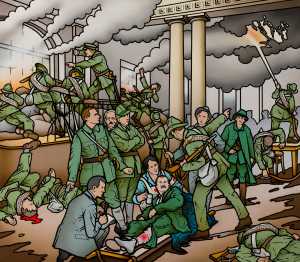
HEAD of the Irish Chamber Orchestra, Gerry Keenan has his own associations with 1916. Involved with much to celebrate the 75th anniversary in Dublin in 1991, he created a series of concerts under the ‘Bards, Ballads and Blues’ banner with box player/ RTE producer Tony McMahon and Robert Ballagh, “a good friend of mine and we did all sort of things”.
John Kinsella was commissioned for a piece, ‘The Splendid Year’, as was Bill Whelan. There were other events, marches and works composed.
Now for Limerick, approaching the centenary with the Orchestra, “I really wanted to do something for 1916 for all sorts of reasons. My grandfather Patrick Young, then aged 16, was in the Marrowbone Lane garrison with two of his brothers and he wound up being interned”.
Look to St Mary’s Cathedral for Thursday April 7, 8pm for an evening of music and poetry and passion. ‘1916 – Revolution and Rhetoric’ is the title embracing eight ICO members, traditional musicians from the Albiez Trio, with Des Keogh bringing it all together in words and violinist Katherine Hunka directing.
Themes of love, loss and transience dominate.
“I think there is a great appetite out there for commemorating [Easter Rising] in a way that is truly respectful,” Keenan continues.“I wanted Des for it as his is a unique voice. He’s a man in his 80s and steeped in music – and through programmes such as ‘Music for Middlebrows’.
Keogh will open proceedings with ‘The Rose of Tralee’ by WB Yeats and then Padraic Pearse’s ‘The Wayfarer’. On to his delivery of Kinsella’s ‘The Splendid Years’ which is a nod to Pierse, with music by Francis O’Neill written in the early 1900s.
Arnold Bax, the composer and poet who had a friendship with Pearse, wrote ‘In Memoriam (1916)’ and ’A Ballad of Dublin – 1916’ which have to feature. Through Keogh’s masterful voice we will hear the intent of ‘Easter 1916’ and its terrible beauty by Yeats.
On to the Albiez Trio with traditional music by Cormac Breatnach, composer and recording artist. He’s on tin whistle himself and singing, with Laoise Kelly on harp and Tola Custy on fiddle for three pieces, one 17th century.
A last word from Gerry Keenan, who has brought the concept together and chose St Mary’s for its historic backdrop: “I love that our first music is from John Kinsella who is in his eighties and that we finish up with Sam Perkins’ [arrangement of] ‘The Foggy Dew’ for strings, electronics and for singing voice.
“Sam Perkins is in his 20s”.
It’s another way to honour the generations and activists of this 100 years. Book on irishchamberorchestra.com





